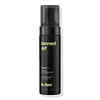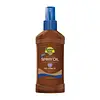What's inside
What's inside
 Key Ingredients
Key Ingredients

 Benefits
Benefits

 Concerns
Concerns

 Ingredients Side-by-side
Ingredients Side-by-side

Water
Skin ConditioningPropylene Glycol
HumectantDihydroxyacetone
Skin ConditioningPEG-6 Caprylic/Capric Glycerides
EmulsifyingCaramel
Cosmetic ColorantDihydroxypropyl PEG-5 Linoleammonium Chloride
PEG-7 Glyceryl Cocoate
EmulsifyingPhenoxyethanol
PreservativeCaprylyl Glycol
EmollientPotassium Sorbate
PreservativeHexylene Glycol
EmulsifyingMelanin
Skin ProtectingArgania Spinosa Kernel Oil
EmollientMacadamia Integrifolia Seed Oil
Skin ConditioningCocos Nucifera Oil
MaskingSimmondsia Chinensis Seed Oil
EmollientRosa Canina Fruit Oil
EmollientVitis Vinifera Seed Oil
EmollientPersea Gratissima Oil
Skin ConditioningCucumis Sativus Fruit Extract
EmollientAscorbic Acid
AntioxidantTocopheryl Acetate
AntioxidantCI 19140
Cosmetic ColorantCI 61570
Cosmetic ColorantCI 16035
Cosmetic ColorantCI 17200
Cosmetic ColorantCI 42090
Cosmetic ColorantCI 15985
Cosmetic ColorantWater, Propylene Glycol, Dihydroxyacetone, PEG-6 Caprylic/Capric Glycerides, Caramel, Dihydroxypropyl PEG-5 Linoleammonium Chloride, PEG-7 Glyceryl Cocoate, Phenoxyethanol, Caprylyl Glycol, Potassium Sorbate, Hexylene Glycol, Melanin, Argania Spinosa Kernel Oil, Macadamia Integrifolia Seed Oil, Cocos Nucifera Oil, Simmondsia Chinensis Seed Oil, Rosa Canina Fruit Oil, Vitis Vinifera Seed Oil, Persea Gratissima Oil, Cucumis Sativus Fruit Extract, Ascorbic Acid, Tocopheryl Acetate, CI 19140, CI 61570, CI 16035, CI 17200, CI 42090, CI 15985
Butyl Methoxydibenzoylmethane 3%
UV AbsorberHomosalate 9%
Skin ConditioningEthylhexyl Salicylate 4.5%
UV AbsorberOctocrylene 2.4%
UV AbsorberParaffinum Liquidum
EmollientC12-15 Alkyl Benzoate
AntimicrobialCaprylyl Glycol
EmollientDiethylhexyl 2,6-Naphthalate
EmollientIsopropyl Myristate
EmollientCocos Nucifera Oil
MaskingVitis Vinifera Seed Oil
EmollientTheobroma Cacao Seed Butter
EmollientTocopheryl Acetate
AntioxidantHelianthus Annuus Seed Oil
EmollientZea Mays Oil
EmulsifyingAloe Barbadensis Leaf Extract
EmollientDaucus Carota Sativa Root Extract
Skin ConditioningMusa Sapientum Fruit Extract
Skin ConditioningPhenoxyethanol
PreservativeParfum
MaskingButyl Methoxydibenzoylmethane 3%, Homosalate 9%, Ethylhexyl Salicylate 4.5%, Octocrylene 2.4%, Paraffinum Liquidum, C12-15 Alkyl Benzoate, Caprylyl Glycol, Diethylhexyl 2,6-Naphthalate, Isopropyl Myristate, Cocos Nucifera Oil, Vitis Vinifera Seed Oil, Theobroma Cacao Seed Butter, Tocopheryl Acetate, Helianthus Annuus Seed Oil, Zea Mays Oil, Aloe Barbadensis Leaf Extract, Daucus Carota Sativa Root Extract, Musa Sapientum Fruit Extract, Phenoxyethanol, Parfum
Ingredients Explained
These ingredients are found in both products.
Ingredients higher up in an ingredient list are typically present in a larger amount.
Caprylyl Glycol is a humectant and emollient, meaning it attracts and preserves moisture.
It is a common ingredient in many products, especially those designed to hydrate skin. The primary benefits are retaining moisture, skin softening, and promoting a healthy skin barrier.
Though Caprylyl Glycol is an alcohol derived from fatty acids, it is not the kind that can dry out skin.
This ingredient is also used as a preservative to extend the life of products. It has slight antimicrobial properties.
Learn more about Caprylyl GlycolCocos Nucifera Oil is obtained from the kernels of the coconut fruit. In other words, this is coconut oil.
Coconut Oil is rich in fatty acids with lauric acid making up the majority of these. It also contains linoleic acid. Due to this high fatty acid content, coconut oil helps trap moisture and soften skin.
Despite being antibacterial, coconut oil may not be great for acne-prone skin. It is comedogenic and may clog pores. This ingredient may not be safe for malassezia or fungal acne.
Note: Coconut Oil should not replace your sunscreen for UV protection. Studies show it only blocks about 20% of UV.
This oil is non-volatile and has a light scent.
The term 'fragrance' is not regulated in many countries. In many cases, it is up to the brand to define this term. For instance, many brands choose to label themselves as "fragrance-free" because they are not using synthetic fragrances. However, their products may still contain ingredients such as essential oils that are considered a fragrance.
Learn more about Cocos Nucifera OilPhenoxyethanol is a preservative that has germicide, antimicrobial, and aromatic properties. Studies show that phenoxyethanol can prevent microbial growth. By itself, it has a scent that is similar to that of a rose.
It's often used in formulations along with Caprylyl Glycol to preserve the shelf life of products.
Tocopheryl Acetate is AKA Vitamin E. It is an antioxidant and protects your skin from free radicals. Free radicals damage the skin by breaking down collagen.
One study found using Tocopheryl Acetate with Vitamin C decreased the number of sunburned cells.
Tocopheryl Acetate is commonly found in both skincare and dietary supplements.
Learn more about Tocopheryl AcetateVitis Vinifera Seed Oil comes from the grape vine. Grape seeds are a byproduct of creating grape juice or wine.
The components of grape seeds have many skin benefits. Research has found it to be antimicrobial and anti-inflammatory. It also contains many potent antioxidants such as Vitamin E , Vitamin C, proanthocyanidins, polyphenols, flavonoids, and anthocyanins. Proanthocyanidin has been shown to help even out skin tone.
Antioxidants help fight free-radical molecules. Free-radical molecules are capable of damaging our cells and other genetic material. Antioxidants help stabilize free-radicals by donating extra electrons. Grape seed extract may help reduce the signs of aging.
The antimicrobial properties of grape seed may help treat acne. However, more research is needed to support this claim.
Grape seed has also been found to help absorb UV rays. Grape seed extract should not replace your sunscreen.
The fatty acids of grape seed oil give it emollient properties. Emollients help soothe and soften your skin by creating a film. This film traps moisture within, keeping your skin hydrated.
Learn more about Vitis Vinifera Seed Oil